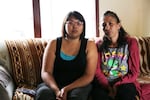“Total crisis” was the phrase Sonya Moody-Jurado used in her Capitol Hill testimony to describe Chemawa Indian School, an off-reservation boarding school managed by the U.S. Bureau of Indian Education (BIE).
Moody-Jurado should know the school’s problems; she chaired the school board from 2015 to 2018.
Chemawa leaders' failure to protect the basic health and safety of children in the school's care was one of the central themes during the two-hour hearing before the Indigenous Affairs Subcommittee of the U.S. House Natural Resources Committee. OPB's reporting on the Salem school in 2017 and subsequent questioning by members of Oregon's congressional delegation prompted the hearing.
Beatrice Willis told lawmakers about her son Marshall Friday, who died of a drug overdose in May 2017, two weeks after graduating from Chemawa.
Willis said her son had health problems school officials knew about but didn't share with her.
“Unknown to me, Marshall was suffering from severe depression and suicidal ideation and had been hearing voices telling him to hurt himself since 2014,” Willis testified.
Willis said her son downplayed his mental illness, and that the school and an on-campus health clinic didn’t provide her with more information. She said her son self-medicated with inhalants, in part because Chemawa made it difficult for him to get proper medications. What Willis described was a pattern of hiding rather than sharing information, a practice that came with deadly consequences.

Beatrice Willis and Marisha Friday, July 2017.
Rob Manning / OPB
Treasa Keith pushed aside her prepared testimony to tell the subcommittee how the school mishandled a medical emergency, which led to her daughter's death in her Chemawa dorm room in 2014.
Keith obtained police and autopsy reports that outlined a confused and chaotic response as her daughter Melissa Abell struggled to breathe. Those reports showed Keith that dorm staff were nowhere to be found and that Abell’s health problem had been misdiagnosed and miscommunicated, leaving her daughter’s roommates struggling to help.

Melissa Abell
Courtesy of Treasa Keith
“My heart goes out to the girls who were there trying to save my daughter’s life, because no child should have to see that — no child should have to be put in that position,” Keith told the subcommittee.
Keith’s suggestion going forward?
“To better their trainings, better their schooling ... their health, their safety,” she said.
Two former Chemawa teachers, Celeste Karzon and Joy O’Renick, told the subcommittee that they had concerns about how students were cared for in the dorms and about the practice of sending students home. Both Karzon and O’Renick knew students who’d been expelled, only to later die in an accident or suicide, or to fall through the cracks of reservation school systems.
Karzon and O'Renick left Chemawa years ago, but U.S. Rep. Suzanne Bonamici, D-Ore., noted that students dying after being sent home remains a problem. She spoke of Robert Tillman, a teenager who died last year after being expelled from Chemawa.
The teachers said they would complain, only to have their pleas ignored by supervisors. When they attempted to complain higher up the chain of command, they said they faced retaliation.
O’Renick told the subcommittee about 15-year-old Flint Tall, who was expelled from Chemawa and died soon after on the Pine Ridge Reservation in South Dakota in a drunk driving accident. O’Renick said more than one-third of Chemawa students are sent home partway through the year.
O’Renick said that statistic is an example of the low standards for BIE schools.
“I find it difficult to imagine the backlash most public schools would receive if they expelled 36% of their students in one year,” O’Renick said. “Why is such a result acceptable at a Native school?”

Joy O'Renick was an English Teacher at Chemawa.
Tony Schick / OPB
Answers to that question have been clouded for years. OPB's previous reporting and statements from members of Congress show obfuscation and delay of those answers from people responsible for Chemawa at the highest levels of the BIE, Bureau of Indian Affairs (BIA) and Department of Interior.
No one directly responsible for running the school attended the hearing. The school superintendent, academic principal, head of the dormitories and the business manager were not there, crystallizing for the subcommittee Chemawa leadership's avoidance of responsibility.
Interior sent Deputy Assistant Secretary Mark Cruz, a member of the Klamath tribe and a former teacher at a tribal school. Cruz said school administrators had to be at Chemawa.
“It’s a school day, and so we felt best that school leadership be at school,” Cruz told the subcommittee.
But Cruz was quickly fact-checked on that. Chemawa closed for the summer two weeks ago. That inconsistency angered Rep. Kurt Schrader, D-Ore., and the subcommittee chair, Rep. Ruben Gallego, D-Ariz., who had asked Cruz about the absence of school administrators.
“You lied to me — a chairman of a committee — about why the superintendent was not here,” Gallego said, as he stopped Cruz from interjecting. “So then why would I trust anything that you’re saying from now on?”
No current staff from Chemawa attended, but the explanation for that was clear to Schrader, who says he has heard from teachers who want to talk to his office but feel they can’t.
“I have never been so outraged in my congressional career with the lack of information that I could get from these folks," he said. "The teachers that want to talk to us, the students who want to talk to us, they’re not allowed. That, to me, is unconscionable.”
Schrader later pressed Cruz for a commitment to send a message to staff at BIE schools within the week to let them know that they are allowed to talk to members of Congress.
“Sir, I can do that, yes, sir,” Cruz responded.
Related: Chemawa Indian School
Several members of Congress offered possible solutions to address problems facing Chemawa and other BIE schools.
At one point in the hearing, Rep. Darren Soto, D-Fla., spoke directly to Willis and Keith.
“Not only do you have our apologies,” Soto said to the parents who had lost Chemawa students, "but we will honor your losses with action, which I think is probably far more important today.”
Soto asked about creating parent-advocate roles at Chemawa, people who could serve as liaisons between the boarding school and parents. Willis and Keith agreed that would be a good step.
The Florida congressman asked the former teachers about creating a confidential whistleblower process with incentives for teachers to share information, as well as a separate Inspector General for the BIE answerable to Congress rather than the BIA.
Soto also suggested establishing elected school boards for off-reservation boarding schools consisting of tribal representatives. Currently, Chemawa has only an advisory school board that lacks true governing powers.
Sonya Moody-Jurado, the former chair of Chemawa’s advisory board, also suggested empowering a future board with more authority than the one she served on. And she circled back to the welfare of the Native youth who rely on Chemawa to take care of them, emphasizing the need for 24-hour mental health support and culture-based instruction and programs.
Members of Congress suggested they could return to Chemawa if they’re not seeing signs of progress, and they said legislation was a likely next step given the lack of action on the part of federal authorities entrusted with running off-reservation boarding schools such as Chemawa.
Editor's Note: An earlier version of this story misidentified the state Rep. Darren Soto represents. He represents Florida’s 9th district. OPB apologizes for the error.